Business Ethics and Responsible Management: A Hospitality Study
VerifiedAdded on 2023/06/13
|13
|3740
|460
Essay
AI Summary
This essay explores business ethics and responsible management within the hospitality industry, addressing ethical issues such as harassment, human trafficking, and slavery. It highlights the importance of ethics in providing guidelines for acceptable conduct, fostering customer loyalty, and maintaining a successful workforce. The role of businesses in society extends beyond profit-making to contributing to local communities and solving social issues. Stakeholders, including customers, employees, competitors, and the company itself, are impacted by ethical issues, influencing reputation and financial stability. The essay provides examples of good and bad ethical practices, such as Premier Inn's approach to modern slavery versus Hilton's involvement in unethical activities. Recommendations include facilitating transparency, practicing fairness, and avoiding toxic work cultures. Ethical theories, such as utilitarianism and Kant's theory of ethics, are applied to hospitality issues, providing frameworks for decision-making and action. Utilitarianism focuses on maximizing good for the greatest number, while Kant's theory emphasizes treating individuals as ends rather than means.
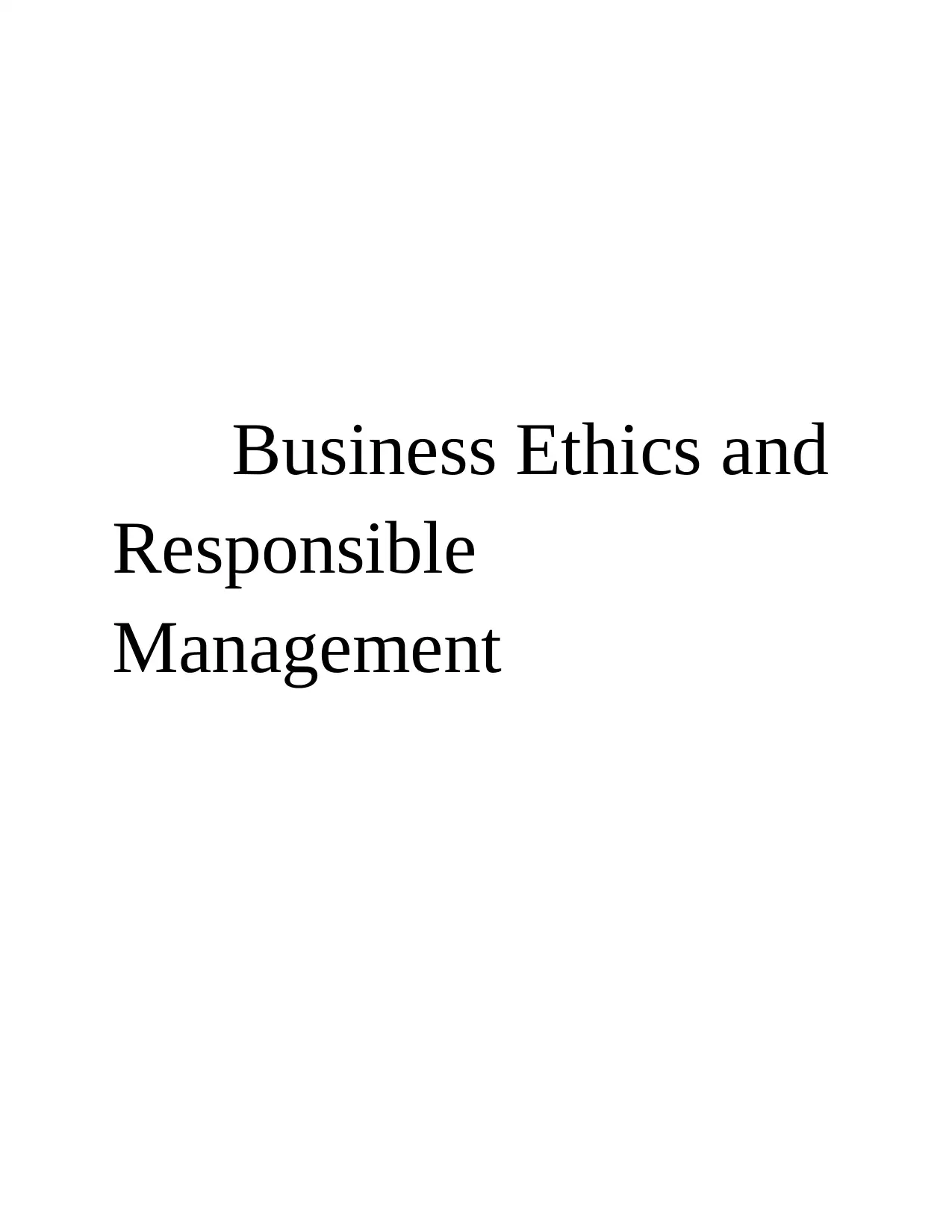
Business Ethics and
Responsible
Management
Responsible
Management
Paraphrase This Document
Need a fresh take? Get an instant paraphrase of this document with our AI Paraphraser
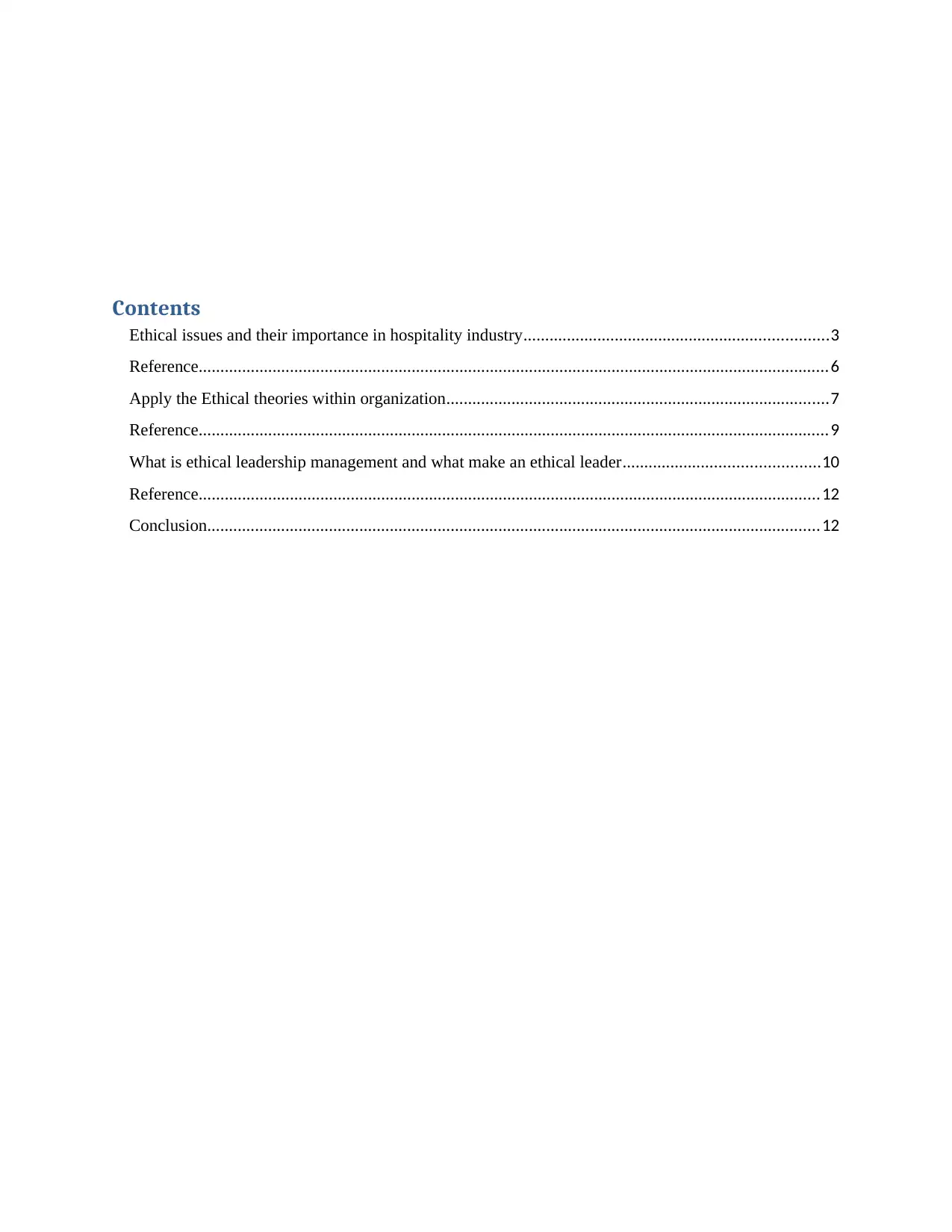
Contents
Ethical issues and their importance in hospitality industry......................................................................3
Reference.................................................................................................................................................6
Apply the Ethical theories within organization........................................................................................7
Reference.................................................................................................................................................9
What is ethical leadership management and what make an ethical leader.............................................10
Reference...............................................................................................................................................12
Conclusion.............................................................................................................................................12
Ethical issues and their importance in hospitality industry......................................................................3
Reference.................................................................................................................................................6
Apply the Ethical theories within organization........................................................................................7
Reference.................................................................................................................................................9
What is ethical leadership management and what make an ethical leader.............................................10
Reference...............................................................................................................................................12
Conclusion.............................................................................................................................................12
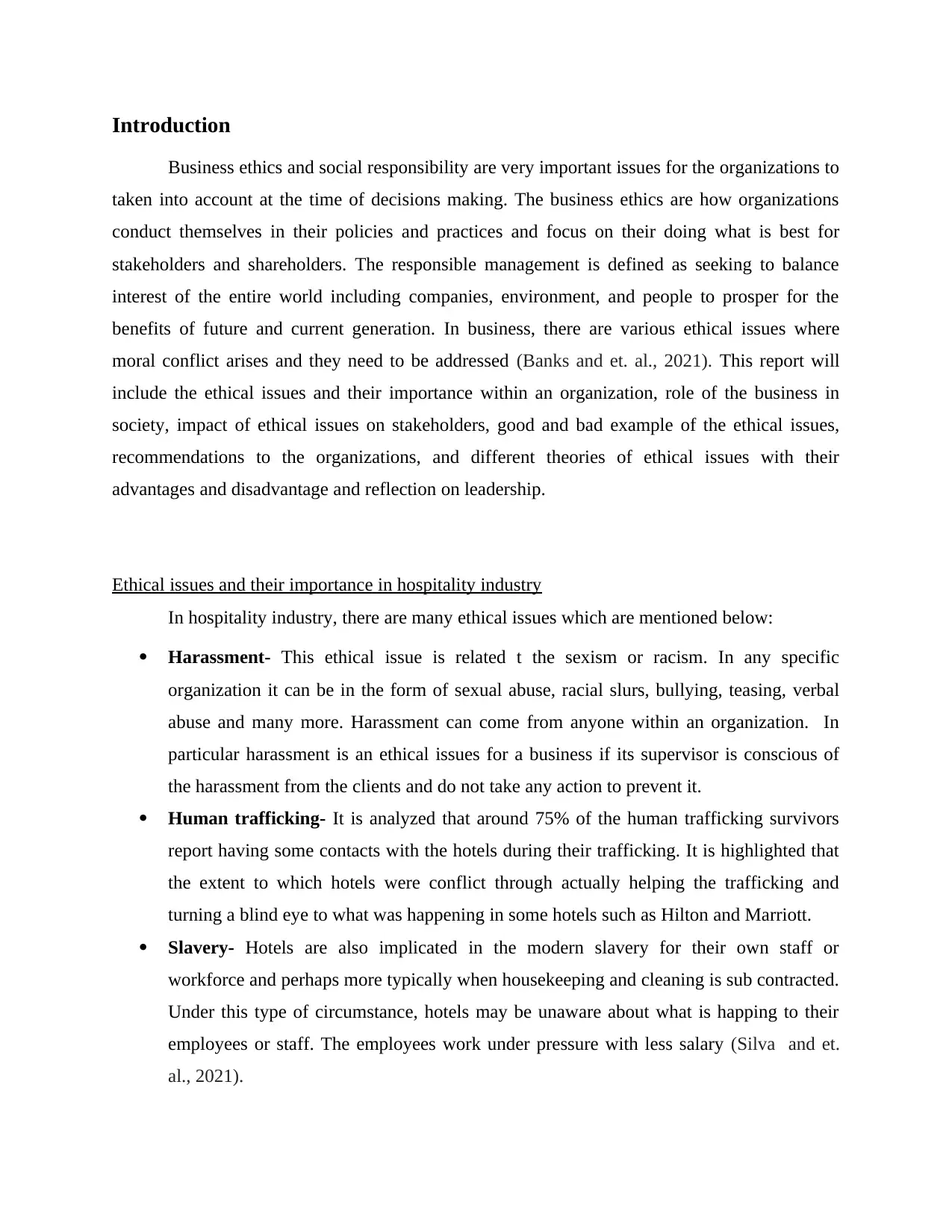
Introduction
Business ethics and social responsibility are very important issues for the organizations to
taken into account at the time of decisions making. The business ethics are how organizations
conduct themselves in their policies and practices and focus on their doing what is best for
stakeholders and shareholders. The responsible management is defined as seeking to balance
interest of the entire world including companies, environment, and people to prosper for the
benefits of future and current generation. In business, there are various ethical issues where
moral conflict arises and they need to be addressed (Banks and et. al., 2021). This report will
include the ethical issues and their importance within an organization, role of the business in
society, impact of ethical issues on stakeholders, good and bad example of the ethical issues,
recommendations to the organizations, and different theories of ethical issues with their
advantages and disadvantage and reflection on leadership.
Ethical issues and their importance in hospitality industry
In hospitality industry, there are many ethical issues which are mentioned below:
Harassment- This ethical issue is related t the sexism or racism. In any specific
organization it can be in the form of sexual abuse, racial slurs, bullying, teasing, verbal
abuse and many more. Harassment can come from anyone within an organization. In
particular harassment is an ethical issues for a business if its supervisor is conscious of
the harassment from the clients and do not take any action to prevent it.
Human trafficking- It is analyzed that around 75% of the human trafficking survivors
report having some contacts with the hotels during their trafficking. It is highlighted that
the extent to which hotels were conflict through actually helping the trafficking and
turning a blind eye to what was happening in some hotels such as Hilton and Marriott.
Slavery- Hotels are also implicated in the modern slavery for their own staff or
workforce and perhaps more typically when housekeeping and cleaning is sub contracted.
Under this type of circumstance, hotels may be unaware about what is happing to their
employees or staff. The employees work under pressure with less salary (Silva and et.
al., 2021).
Business ethics and social responsibility are very important issues for the organizations to
taken into account at the time of decisions making. The business ethics are how organizations
conduct themselves in their policies and practices and focus on their doing what is best for
stakeholders and shareholders. The responsible management is defined as seeking to balance
interest of the entire world including companies, environment, and people to prosper for the
benefits of future and current generation. In business, there are various ethical issues where
moral conflict arises and they need to be addressed (Banks and et. al., 2021). This report will
include the ethical issues and their importance within an organization, role of the business in
society, impact of ethical issues on stakeholders, good and bad example of the ethical issues,
recommendations to the organizations, and different theories of ethical issues with their
advantages and disadvantage and reflection on leadership.
Ethical issues and their importance in hospitality industry
In hospitality industry, there are many ethical issues which are mentioned below:
Harassment- This ethical issue is related t the sexism or racism. In any specific
organization it can be in the form of sexual abuse, racial slurs, bullying, teasing, verbal
abuse and many more. Harassment can come from anyone within an organization. In
particular harassment is an ethical issues for a business if its supervisor is conscious of
the harassment from the clients and do not take any action to prevent it.
Human trafficking- It is analyzed that around 75% of the human trafficking survivors
report having some contacts with the hotels during their trafficking. It is highlighted that
the extent to which hotels were conflict through actually helping the trafficking and
turning a blind eye to what was happening in some hotels such as Hilton and Marriott.
Slavery- Hotels are also implicated in the modern slavery for their own staff or
workforce and perhaps more typically when housekeeping and cleaning is sub contracted.
Under this type of circumstance, hotels may be unaware about what is happing to their
employees or staff. The employees work under pressure with less salary (Silva and et.
al., 2021).
⊘ This is a preview!⊘
Do you want full access?
Subscribe today to unlock all pages.

Trusted by 1+ million students worldwide
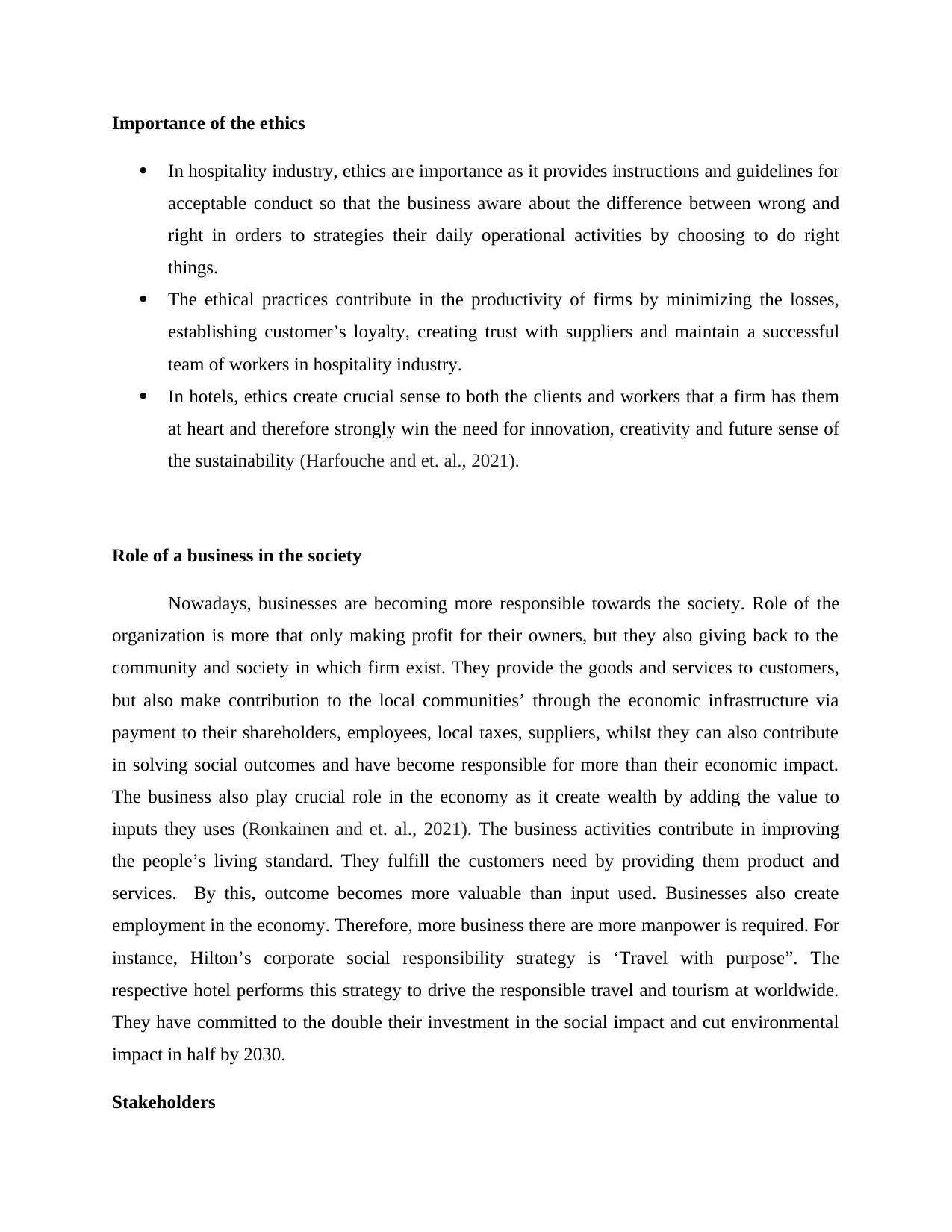
Importance of the ethics
In hospitality industry, ethics are importance as it provides instructions and guidelines for
acceptable conduct so that the business aware about the difference between wrong and
right in orders to strategies their daily operational activities by choosing to do right
things.
The ethical practices contribute in the productivity of firms by minimizing the losses,
establishing customer’s loyalty, creating trust with suppliers and maintain a successful
team of workers in hospitality industry.
In hotels, ethics create crucial sense to both the clients and workers that a firm has them
at heart and therefore strongly win the need for innovation, creativity and future sense of
the sustainability (Harfouche and et. al., 2021).
Role of a business in the society
Nowadays, businesses are becoming more responsible towards the society. Role of the
organization is more that only making profit for their owners, but they also giving back to the
community and society in which firm exist. They provide the goods and services to customers,
but also make contribution to the local communities’ through the economic infrastructure via
payment to their shareholders, employees, local taxes, suppliers, whilst they can also contribute
in solving social outcomes and have become responsible for more than their economic impact.
The business also play crucial role in the economy as it create wealth by adding the value to
inputs they uses (Ronkainen and et. al., 2021). The business activities contribute in improving
the people’s living standard. They fulfill the customers need by providing them product and
services. By this, outcome becomes more valuable than input used. Businesses also create
employment in the economy. Therefore, more business there are more manpower is required. For
instance, Hilton’s corporate social responsibility strategy is ‘Travel with purpose”. The
respective hotel performs this strategy to drive the responsible travel and tourism at worldwide.
They have committed to the double their investment in the social impact and cut environmental
impact in half by 2030.
Stakeholders
In hospitality industry, ethics are importance as it provides instructions and guidelines for
acceptable conduct so that the business aware about the difference between wrong and
right in orders to strategies their daily operational activities by choosing to do right
things.
The ethical practices contribute in the productivity of firms by minimizing the losses,
establishing customer’s loyalty, creating trust with suppliers and maintain a successful
team of workers in hospitality industry.
In hotels, ethics create crucial sense to both the clients and workers that a firm has them
at heart and therefore strongly win the need for innovation, creativity and future sense of
the sustainability (Harfouche and et. al., 2021).
Role of a business in the society
Nowadays, businesses are becoming more responsible towards the society. Role of the
organization is more that only making profit for their owners, but they also giving back to the
community and society in which firm exist. They provide the goods and services to customers,
but also make contribution to the local communities’ through the economic infrastructure via
payment to their shareholders, employees, local taxes, suppliers, whilst they can also contribute
in solving social outcomes and have become responsible for more than their economic impact.
The business also play crucial role in the economy as it create wealth by adding the value to
inputs they uses (Ronkainen and et. al., 2021). The business activities contribute in improving
the people’s living standard. They fulfill the customers need by providing them product and
services. By this, outcome becomes more valuable than input used. Businesses also create
employment in the economy. Therefore, more business there are more manpower is required. For
instance, Hilton’s corporate social responsibility strategy is ‘Travel with purpose”. The
respective hotel performs this strategy to drive the responsible travel and tourism at worldwide.
They have committed to the double their investment in the social impact and cut environmental
impact in half by 2030.
Stakeholders
Paraphrase This Document
Need a fresh take? Get an instant paraphrase of this document with our AI Paraphraser
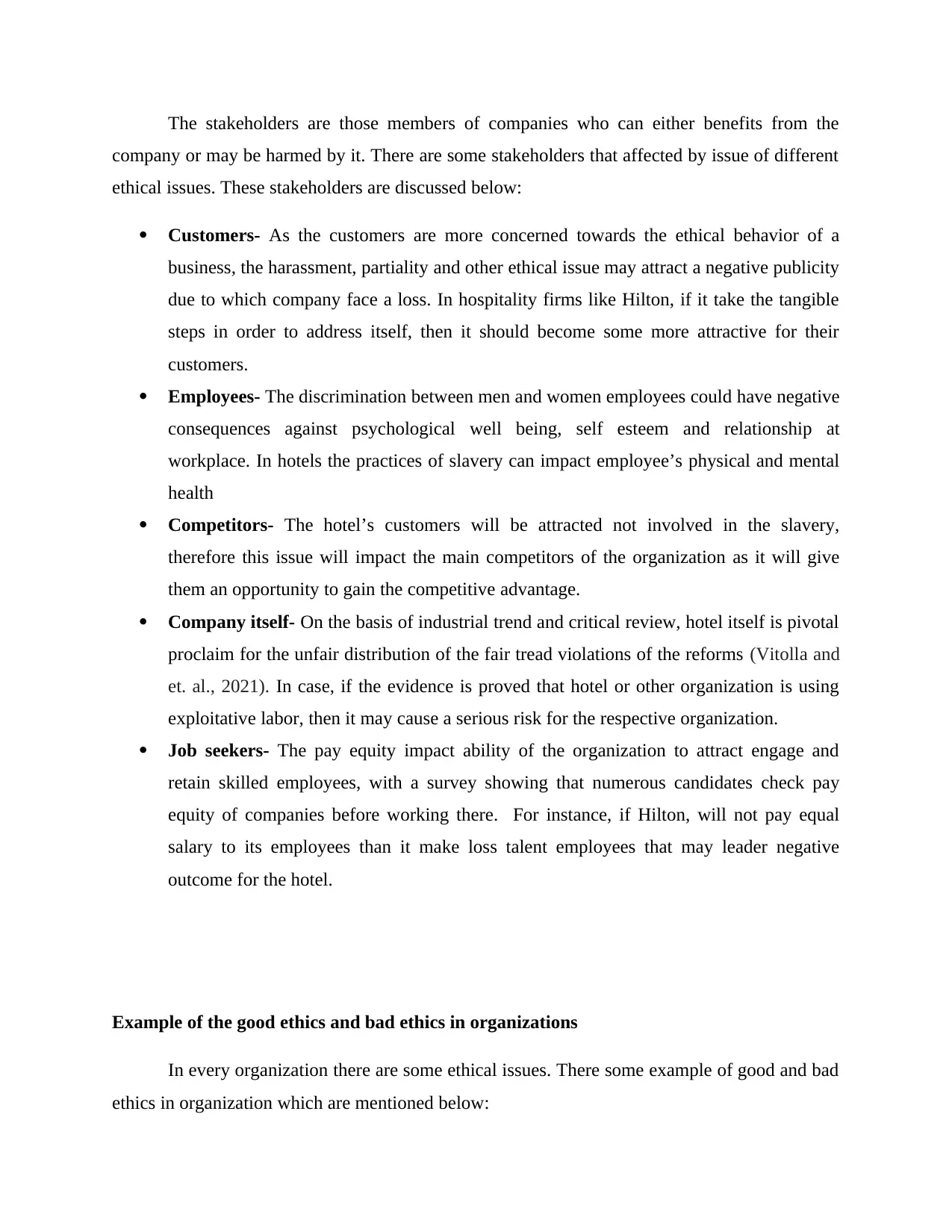
The stakeholders are those members of companies who can either benefits from the
company or may be harmed by it. There are some stakeholders that affected by issue of different
ethical issues. These stakeholders are discussed below:
Customers- As the customers are more concerned towards the ethical behavior of a
business, the harassment, partiality and other ethical issue may attract a negative publicity
due to which company face a loss. In hospitality firms like Hilton, if it take the tangible
steps in order to address itself, then it should become some more attractive for their
customers.
Employees- The discrimination between men and women employees could have negative
consequences against psychological well being, self esteem and relationship at
workplace. In hotels the practices of slavery can impact employee’s physical and mental
health
Competitors- The hotel’s customers will be attracted not involved in the slavery,
therefore this issue will impact the main competitors of the organization as it will give
them an opportunity to gain the competitive advantage.
Company itself- On the basis of industrial trend and critical review, hotel itself is pivotal
proclaim for the unfair distribution of the fair tread violations of the reforms (Vitolla and
et. al., 2021). In case, if the evidence is proved that hotel or other organization is using
exploitative labor, then it may cause a serious risk for the respective organization.
Job seekers- The pay equity impact ability of the organization to attract engage and
retain skilled employees, with a survey showing that numerous candidates check pay
equity of companies before working there. For instance, if Hilton, will not pay equal
salary to its employees than it make loss talent employees that may leader negative
outcome for the hotel.
Example of the good ethics and bad ethics in organizations
In every organization there are some ethical issues. There some example of good and bad
ethics in organization which are mentioned below:
company or may be harmed by it. There are some stakeholders that affected by issue of different
ethical issues. These stakeholders are discussed below:
Customers- As the customers are more concerned towards the ethical behavior of a
business, the harassment, partiality and other ethical issue may attract a negative publicity
due to which company face a loss. In hospitality firms like Hilton, if it take the tangible
steps in order to address itself, then it should become some more attractive for their
customers.
Employees- The discrimination between men and women employees could have negative
consequences against psychological well being, self esteem and relationship at
workplace. In hotels the practices of slavery can impact employee’s physical and mental
health
Competitors- The hotel’s customers will be attracted not involved in the slavery,
therefore this issue will impact the main competitors of the organization as it will give
them an opportunity to gain the competitive advantage.
Company itself- On the basis of industrial trend and critical review, hotel itself is pivotal
proclaim for the unfair distribution of the fair tread violations of the reforms (Vitolla and
et. al., 2021). In case, if the evidence is proved that hotel or other organization is using
exploitative labor, then it may cause a serious risk for the respective organization.
Job seekers- The pay equity impact ability of the organization to attract engage and
retain skilled employees, with a survey showing that numerous candidates check pay
equity of companies before working there. For instance, if Hilton, will not pay equal
salary to its employees than it make loss talent employees that may leader negative
outcome for the hotel.
Example of the good ethics and bad ethics in organizations
In every organization there are some ethical issues. There some example of good and bad
ethics in organization which are mentioned below:
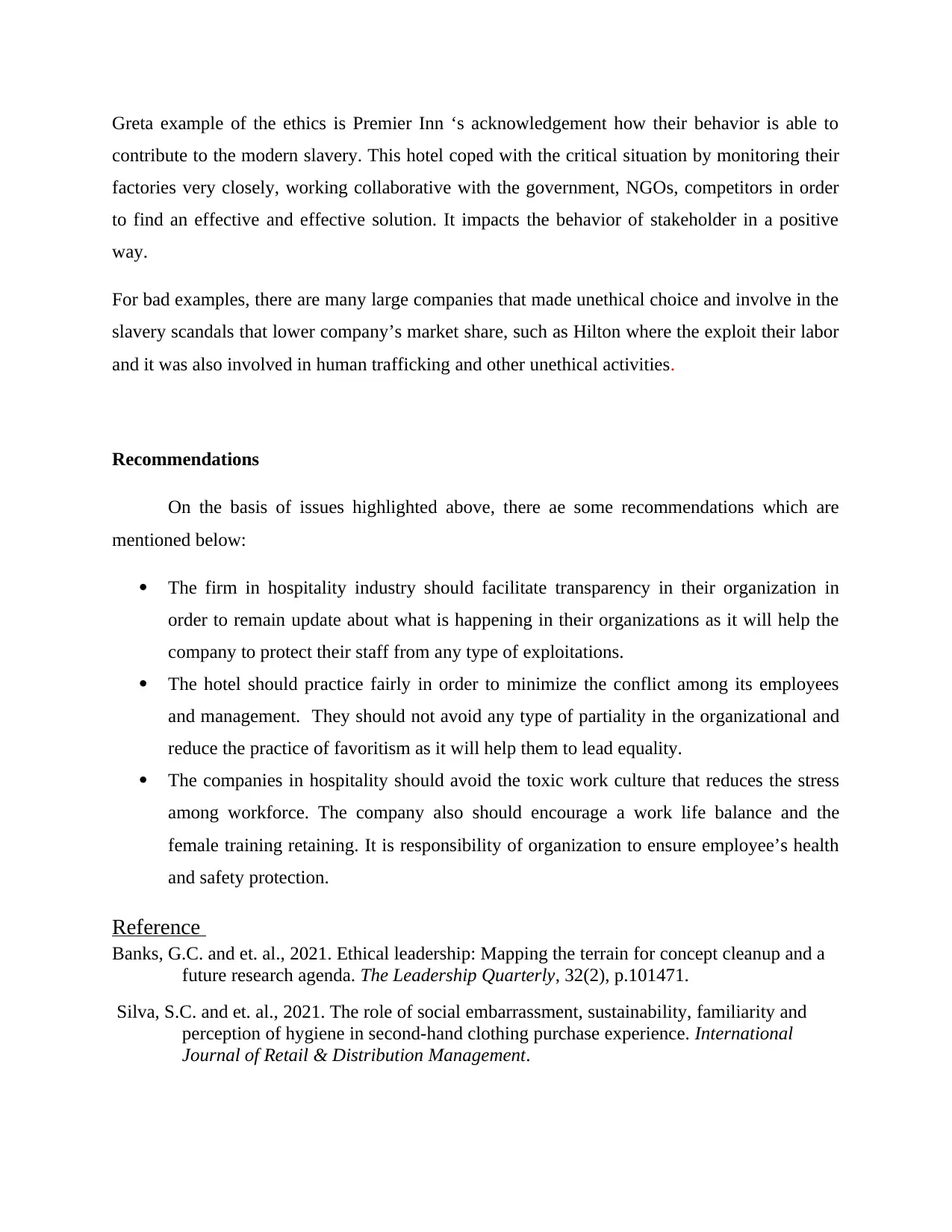
Greta example of the ethics is Premier Inn ‘s acknowledgement how their behavior is able to
contribute to the modern slavery. This hotel coped with the critical situation by monitoring their
factories very closely, working collaborative with the government, NGOs, competitors in order
to find an effective and effective solution. It impacts the behavior of stakeholder in a positive
way.
For bad examples, there are many large companies that made unethical choice and involve in the
slavery scandals that lower company’s market share, such as Hilton where the exploit their labor
and it was also involved in human trafficking and other unethical activities.
Recommendations
On the basis of issues highlighted above, there ae some recommendations which are
mentioned below:
The firm in hospitality industry should facilitate transparency in their organization in
order to remain update about what is happening in their organizations as it will help the
company to protect their staff from any type of exploitations.
The hotel should practice fairly in order to minimize the conflict among its employees
and management. They should not avoid any type of partiality in the organizational and
reduce the practice of favoritism as it will help them to lead equality.
The companies in hospitality should avoid the toxic work culture that reduces the stress
among workforce. The company also should encourage a work life balance and the
female training retaining. It is responsibility of organization to ensure employee’s health
and safety protection.
Reference
Banks, G.C. and et. al., 2021. Ethical leadership: Mapping the terrain for concept cleanup and a
future research agenda. The Leadership Quarterly, 32(2), p.101471.
Silva, S.C. and et. al., 2021. The role of social embarrassment, sustainability, familiarity and
perception of hygiene in second-hand clothing purchase experience. International
Journal of Retail & Distribution Management.
contribute to the modern slavery. This hotel coped with the critical situation by monitoring their
factories very closely, working collaborative with the government, NGOs, competitors in order
to find an effective and effective solution. It impacts the behavior of stakeholder in a positive
way.
For bad examples, there are many large companies that made unethical choice and involve in the
slavery scandals that lower company’s market share, such as Hilton where the exploit their labor
and it was also involved in human trafficking and other unethical activities.
Recommendations
On the basis of issues highlighted above, there ae some recommendations which are
mentioned below:
The firm in hospitality industry should facilitate transparency in their organization in
order to remain update about what is happening in their organizations as it will help the
company to protect their staff from any type of exploitations.
The hotel should practice fairly in order to minimize the conflict among its employees
and management. They should not avoid any type of partiality in the organizational and
reduce the practice of favoritism as it will help them to lead equality.
The companies in hospitality should avoid the toxic work culture that reduces the stress
among workforce. The company also should encourage a work life balance and the
female training retaining. It is responsibility of organization to ensure employee’s health
and safety protection.
Reference
Banks, G.C. and et. al., 2021. Ethical leadership: Mapping the terrain for concept cleanup and a
future research agenda. The Leadership Quarterly, 32(2), p.101471.
Silva, S.C. and et. al., 2021. The role of social embarrassment, sustainability, familiarity and
perception of hygiene in second-hand clothing purchase experience. International
Journal of Retail & Distribution Management.
⊘ This is a preview!⊘
Do you want full access?
Subscribe today to unlock all pages.

Trusted by 1+ million students worldwide
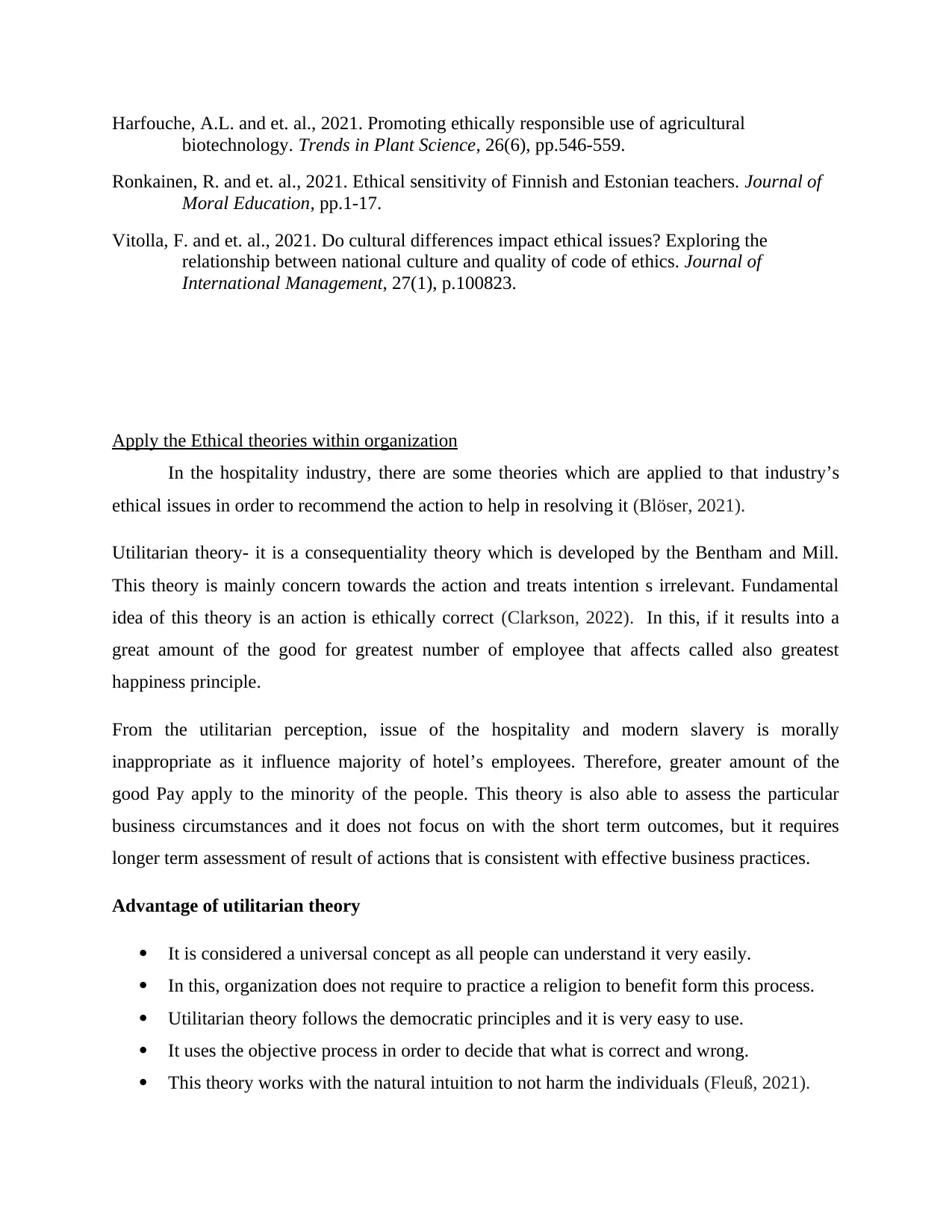
Harfouche, A.L. and et. al., 2021. Promoting ethically responsible use of agricultural
biotechnology. Trends in Plant Science, 26(6), pp.546-559.
Ronkainen, R. and et. al., 2021. Ethical sensitivity of Finnish and Estonian teachers. Journal of
Moral Education, pp.1-17.
Vitolla, F. and et. al., 2021. Do cultural differences impact ethical issues? Exploring the
relationship between national culture and quality of code of ethics. Journal of
International Management, 27(1), p.100823.
Apply the Ethical theories within organization
In the hospitality industry, there are some theories which are applied to that industry’s
ethical issues in order to recommend the action to help in resolving it (Blöser, 2021).
Utilitarian theory- it is a consequentiality theory which is developed by the Bentham and Mill.
This theory is mainly concern towards the action and treats intention s irrelevant. Fundamental
idea of this theory is an action is ethically correct (Clarkson, 2022). In this, if it results into a
great amount of the good for greatest number of employee that affects called also greatest
happiness principle.
From the utilitarian perception, issue of the hospitality and modern slavery is morally
inappropriate as it influence majority of hotel’s employees. Therefore, greater amount of the
good Pay apply to the minority of the people. This theory is also able to assess the particular
business circumstances and it does not focus on with the short term outcomes, but it requires
longer term assessment of result of actions that is consistent with effective business practices.
Advantage of utilitarian theory
It is considered a universal concept as all people can understand it very easily.
In this, organization does not require to practice a religion to benefit form this process.
Utilitarian theory follows the democratic principles and it is very easy to use.
It uses the objective process in order to decide that what is correct and wrong.
This theory works with the natural intuition to not harm the individuals (Fleuß, 2021).
biotechnology. Trends in Plant Science, 26(6), pp.546-559.
Ronkainen, R. and et. al., 2021. Ethical sensitivity of Finnish and Estonian teachers. Journal of
Moral Education, pp.1-17.
Vitolla, F. and et. al., 2021. Do cultural differences impact ethical issues? Exploring the
relationship between national culture and quality of code of ethics. Journal of
International Management, 27(1), p.100823.
Apply the Ethical theories within organization
In the hospitality industry, there are some theories which are applied to that industry’s
ethical issues in order to recommend the action to help in resolving it (Blöser, 2021).
Utilitarian theory- it is a consequentiality theory which is developed by the Bentham and Mill.
This theory is mainly concern towards the action and treats intention s irrelevant. Fundamental
idea of this theory is an action is ethically correct (Clarkson, 2022). In this, if it results into a
great amount of the good for greatest number of employee that affects called also greatest
happiness principle.
From the utilitarian perception, issue of the hospitality and modern slavery is morally
inappropriate as it influence majority of hotel’s employees. Therefore, greater amount of the
good Pay apply to the minority of the people. This theory is also able to assess the particular
business circumstances and it does not focus on with the short term outcomes, but it requires
longer term assessment of result of actions that is consistent with effective business practices.
Advantage of utilitarian theory
It is considered a universal concept as all people can understand it very easily.
In this, organization does not require to practice a religion to benefit form this process.
Utilitarian theory follows the democratic principles and it is very easy to use.
It uses the objective process in order to decide that what is correct and wrong.
This theory works with the natural intuition to not harm the individuals (Fleuß, 2021).
Paraphrase This Document
Need a fresh take? Get an instant paraphrase of this document with our AI Paraphraser
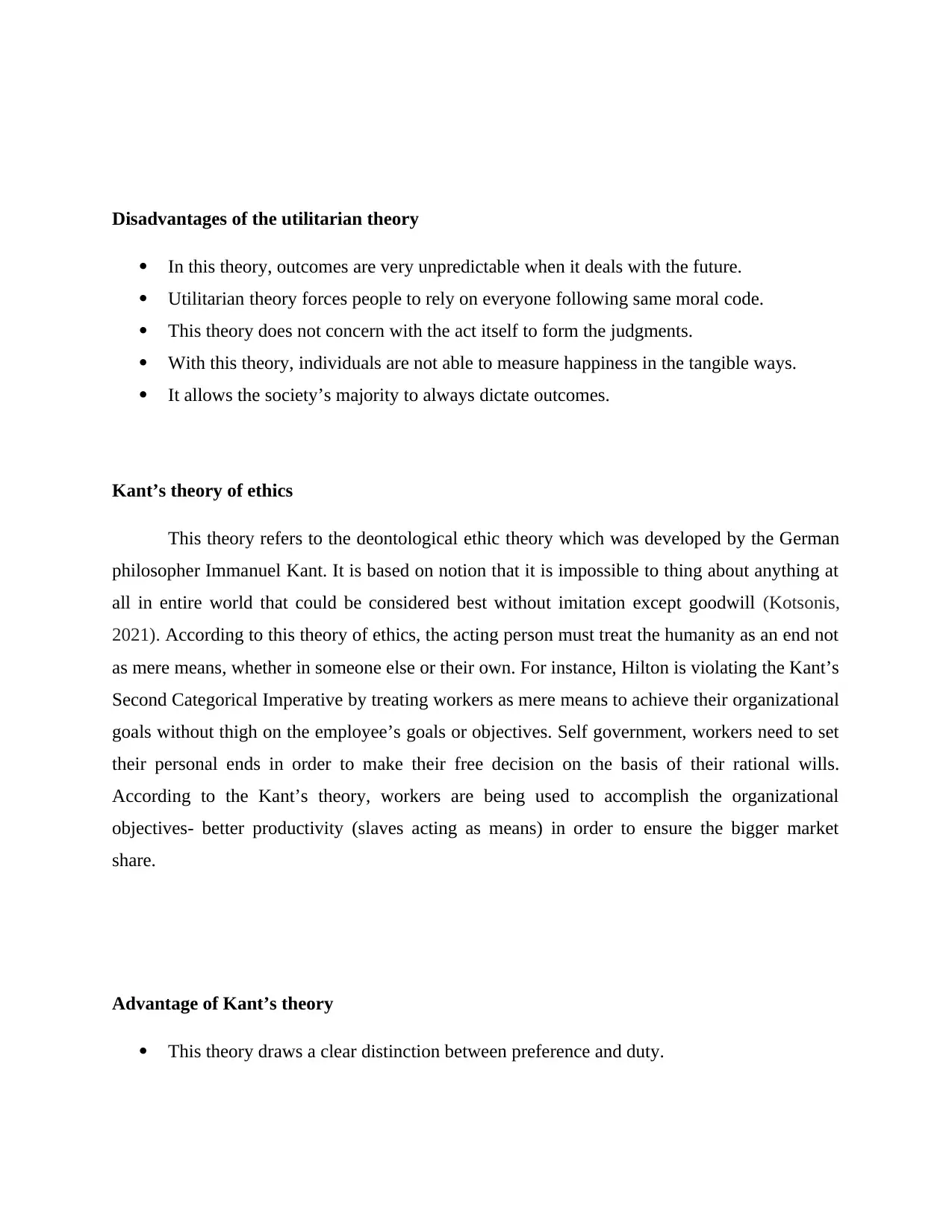
Disadvantages of the utilitarian theory
In this theory, outcomes are very unpredictable when it deals with the future.
Utilitarian theory forces people to rely on everyone following same moral code.
This theory does not concern with the act itself to form the judgments.
With this theory, individuals are not able to measure happiness in the tangible ways.
It allows the society’s majority to always dictate outcomes.
Kant’s theory of ethics
This theory refers to the deontological ethic theory which was developed by the German
philosopher Immanuel Kant. It is based on notion that it is impossible to thing about anything at
all in entire world that could be considered best without imitation except goodwill (Kotsonis,
2021). According to this theory of ethics, the acting person must treat the humanity as an end not
as mere means, whether in someone else or their own. For instance, Hilton is violating the Kant’s
Second Categorical Imperative by treating workers as mere means to achieve their organizational
goals without thigh on the employee’s goals or objectives. Self government, workers need to set
their personal ends in order to make their free decision on the basis of their rational wills.
According to the Kant’s theory, workers are being used to accomplish the organizational
objectives- better productivity (slaves acting as means) in order to ensure the bigger market
share.
Advantage of Kant’s theory
This theory draws a clear distinction between preference and duty.
In this theory, outcomes are very unpredictable when it deals with the future.
Utilitarian theory forces people to rely on everyone following same moral code.
This theory does not concern with the act itself to form the judgments.
With this theory, individuals are not able to measure happiness in the tangible ways.
It allows the society’s majority to always dictate outcomes.
Kant’s theory of ethics
This theory refers to the deontological ethic theory which was developed by the German
philosopher Immanuel Kant. It is based on notion that it is impossible to thing about anything at
all in entire world that could be considered best without imitation except goodwill (Kotsonis,
2021). According to this theory of ethics, the acting person must treat the humanity as an end not
as mere means, whether in someone else or their own. For instance, Hilton is violating the Kant’s
Second Categorical Imperative by treating workers as mere means to achieve their organizational
goals without thigh on the employee’s goals or objectives. Self government, workers need to set
their personal ends in order to make their free decision on the basis of their rational wills.
According to the Kant’s theory, workers are being used to accomplish the organizational
objectives- better productivity (slaves acting as means) in order to ensure the bigger market
share.
Advantage of Kant’s theory
This theory draws a clear distinction between preference and duty.
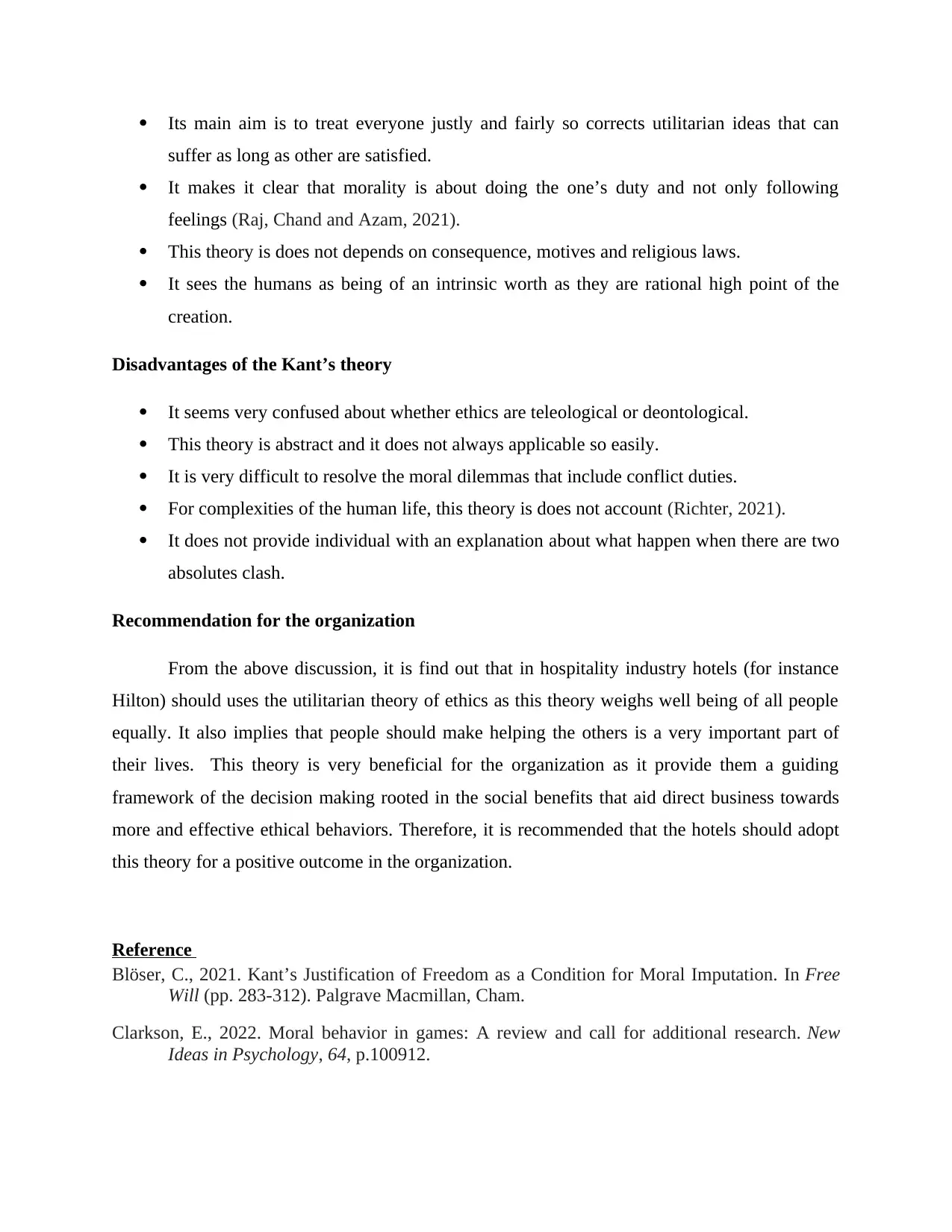
Its main aim is to treat everyone justly and fairly so corrects utilitarian ideas that can
suffer as long as other are satisfied.
It makes it clear that morality is about doing the one’s duty and not only following
feelings (Raj, Chand and Azam, 2021).
This theory is does not depends on consequence, motives and religious laws.
It sees the humans as being of an intrinsic worth as they are rational high point of the
creation.
Disadvantages of the Kant’s theory
It seems very confused about whether ethics are teleological or deontological.
This theory is abstract and it does not always applicable so easily.
It is very difficult to resolve the moral dilemmas that include conflict duties.
For complexities of the human life, this theory is does not account (Richter, 2021).
It does not provide individual with an explanation about what happen when there are two
absolutes clash.
Recommendation for the organization
From the above discussion, it is find out that in hospitality industry hotels (for instance
Hilton) should uses the utilitarian theory of ethics as this theory weighs well being of all people
equally. It also implies that people should make helping the others is a very important part of
their lives. This theory is very beneficial for the organization as it provide them a guiding
framework of the decision making rooted in the social benefits that aid direct business towards
more and effective ethical behaviors. Therefore, it is recommended that the hotels should adopt
this theory for a positive outcome in the organization.
Reference
Blöser, C., 2021. Kant’s Justification of Freedom as a Condition for Moral Imputation. In Free
Will (pp. 283-312). Palgrave Macmillan, Cham.
Clarkson, E., 2022. Moral behavior in games: A review and call for additional research. New
Ideas in Psychology, 64, p.100912.
suffer as long as other are satisfied.
It makes it clear that morality is about doing the one’s duty and not only following
feelings (Raj, Chand and Azam, 2021).
This theory is does not depends on consequence, motives and religious laws.
It sees the humans as being of an intrinsic worth as they are rational high point of the
creation.
Disadvantages of the Kant’s theory
It seems very confused about whether ethics are teleological or deontological.
This theory is abstract and it does not always applicable so easily.
It is very difficult to resolve the moral dilemmas that include conflict duties.
For complexities of the human life, this theory is does not account (Richter, 2021).
It does not provide individual with an explanation about what happen when there are two
absolutes clash.
Recommendation for the organization
From the above discussion, it is find out that in hospitality industry hotels (for instance
Hilton) should uses the utilitarian theory of ethics as this theory weighs well being of all people
equally. It also implies that people should make helping the others is a very important part of
their lives. This theory is very beneficial for the organization as it provide them a guiding
framework of the decision making rooted in the social benefits that aid direct business towards
more and effective ethical behaviors. Therefore, it is recommended that the hotels should adopt
this theory for a positive outcome in the organization.
Reference
Blöser, C., 2021. Kant’s Justification of Freedom as a Condition for Moral Imputation. In Free
Will (pp. 283-312). Palgrave Macmillan, Cham.
Clarkson, E., 2022. Moral behavior in games: A review and call for additional research. New
Ideas in Psychology, 64, p.100912.
⊘ This is a preview!⊘
Do you want full access?
Subscribe today to unlock all pages.

Trusted by 1+ million students worldwide
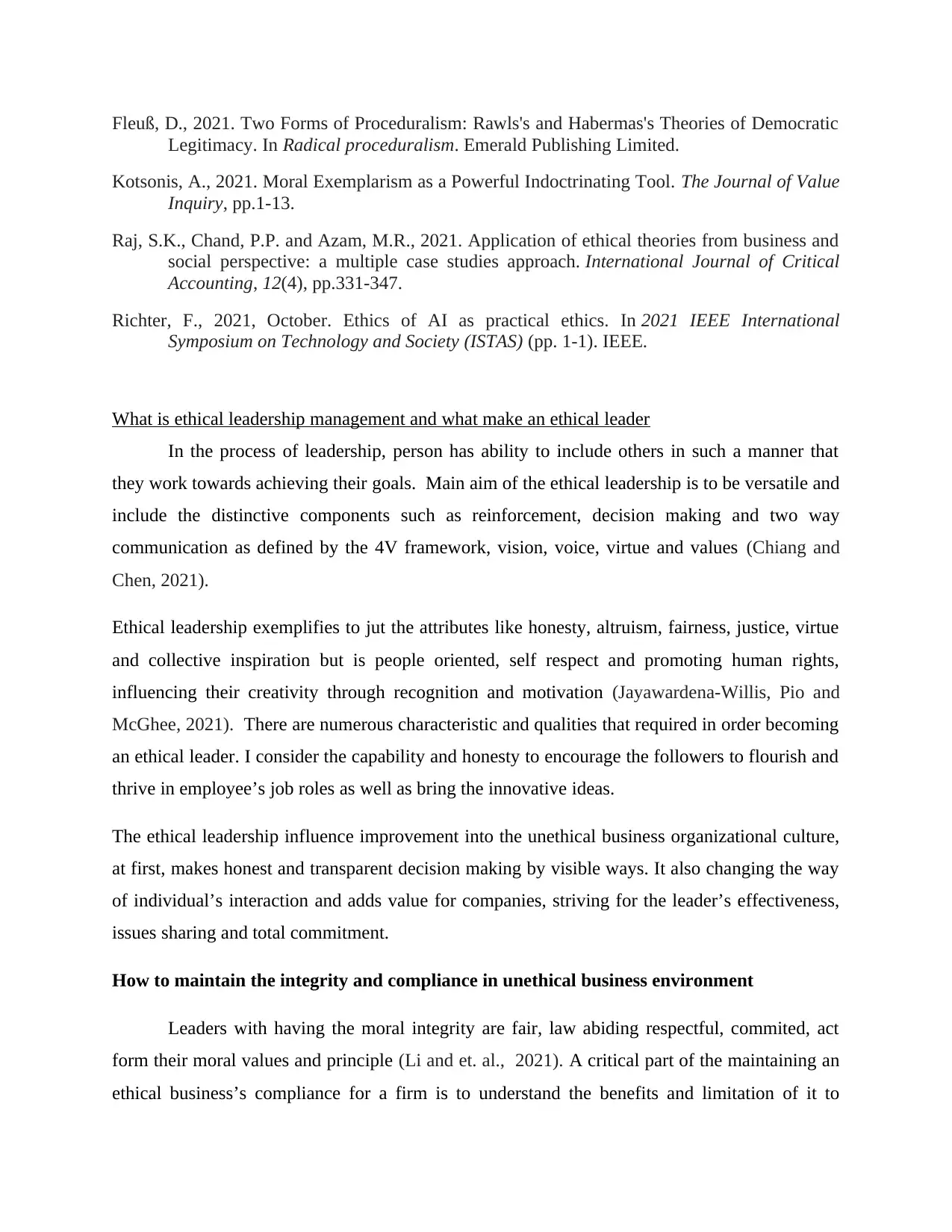
Fleuß, D., 2021. Two Forms of Proceduralism: Rawls's and Habermas's Theories of Democratic
Legitimacy. In Radical proceduralism. Emerald Publishing Limited.
Kotsonis, A., 2021. Moral Exemplarism as a Powerful Indoctrinating Tool. The Journal of Value
Inquiry, pp.1-13.
Raj, S.K., Chand, P.P. and Azam, M.R., 2021. Application of ethical theories from business and
social perspective: a multiple case studies approach. International Journal of Critical
Accounting, 12(4), pp.331-347.
Richter, F., 2021, October. Ethics of AI as practical ethics. In 2021 IEEE International
Symposium on Technology and Society (ISTAS) (pp. 1-1). IEEE.
What is ethical leadership management and what make an ethical leader
In the process of leadership, person has ability to include others in such a manner that
they work towards achieving their goals. Main aim of the ethical leadership is to be versatile and
include the distinctive components such as reinforcement, decision making and two way
communication as defined by the 4V framework, vision, voice, virtue and values (Chiang and
Chen, 2021).
Ethical leadership exemplifies to jut the attributes like honesty, altruism, fairness, justice, virtue
and collective inspiration but is people oriented, self respect and promoting human rights,
influencing their creativity through recognition and motivation (Jayawardena-Willis, Pio and
McGhee, 2021). There are numerous characteristic and qualities that required in order becoming
an ethical leader. I consider the capability and honesty to encourage the followers to flourish and
thrive in employee’s job roles as well as bring the innovative ideas.
The ethical leadership influence improvement into the unethical business organizational culture,
at first, makes honest and transparent decision making by visible ways. It also changing the way
of individual’s interaction and adds value for companies, striving for the leader’s effectiveness,
issues sharing and total commitment.
How to maintain the integrity and compliance in unethical business environment
Leaders with having the moral integrity are fair, law abiding respectful, commited, act
form their moral values and principle (Li and et. al., 2021). A critical part of the maintaining an
ethical business’s compliance for a firm is to understand the benefits and limitation of it to
Legitimacy. In Radical proceduralism. Emerald Publishing Limited.
Kotsonis, A., 2021. Moral Exemplarism as a Powerful Indoctrinating Tool. The Journal of Value
Inquiry, pp.1-13.
Raj, S.K., Chand, P.P. and Azam, M.R., 2021. Application of ethical theories from business and
social perspective: a multiple case studies approach. International Journal of Critical
Accounting, 12(4), pp.331-347.
Richter, F., 2021, October. Ethics of AI as practical ethics. In 2021 IEEE International
Symposium on Technology and Society (ISTAS) (pp. 1-1). IEEE.
What is ethical leadership management and what make an ethical leader
In the process of leadership, person has ability to include others in such a manner that
they work towards achieving their goals. Main aim of the ethical leadership is to be versatile and
include the distinctive components such as reinforcement, decision making and two way
communication as defined by the 4V framework, vision, voice, virtue and values (Chiang and
Chen, 2021).
Ethical leadership exemplifies to jut the attributes like honesty, altruism, fairness, justice, virtue
and collective inspiration but is people oriented, self respect and promoting human rights,
influencing their creativity through recognition and motivation (Jayawardena-Willis, Pio and
McGhee, 2021). There are numerous characteristic and qualities that required in order becoming
an ethical leader. I consider the capability and honesty to encourage the followers to flourish and
thrive in employee’s job roles as well as bring the innovative ideas.
The ethical leadership influence improvement into the unethical business organizational culture,
at first, makes honest and transparent decision making by visible ways. It also changing the way
of individual’s interaction and adds value for companies, striving for the leader’s effectiveness,
issues sharing and total commitment.
How to maintain the integrity and compliance in unethical business environment
Leaders with having the moral integrity are fair, law abiding respectful, commited, act
form their moral values and principle (Li and et. al., 2021). A critical part of the maintaining an
ethical business’s compliance for a firm is to understand the benefits and limitation of it to
Paraphrase This Document
Need a fresh take? Get an instant paraphrase of this document with our AI Paraphraser
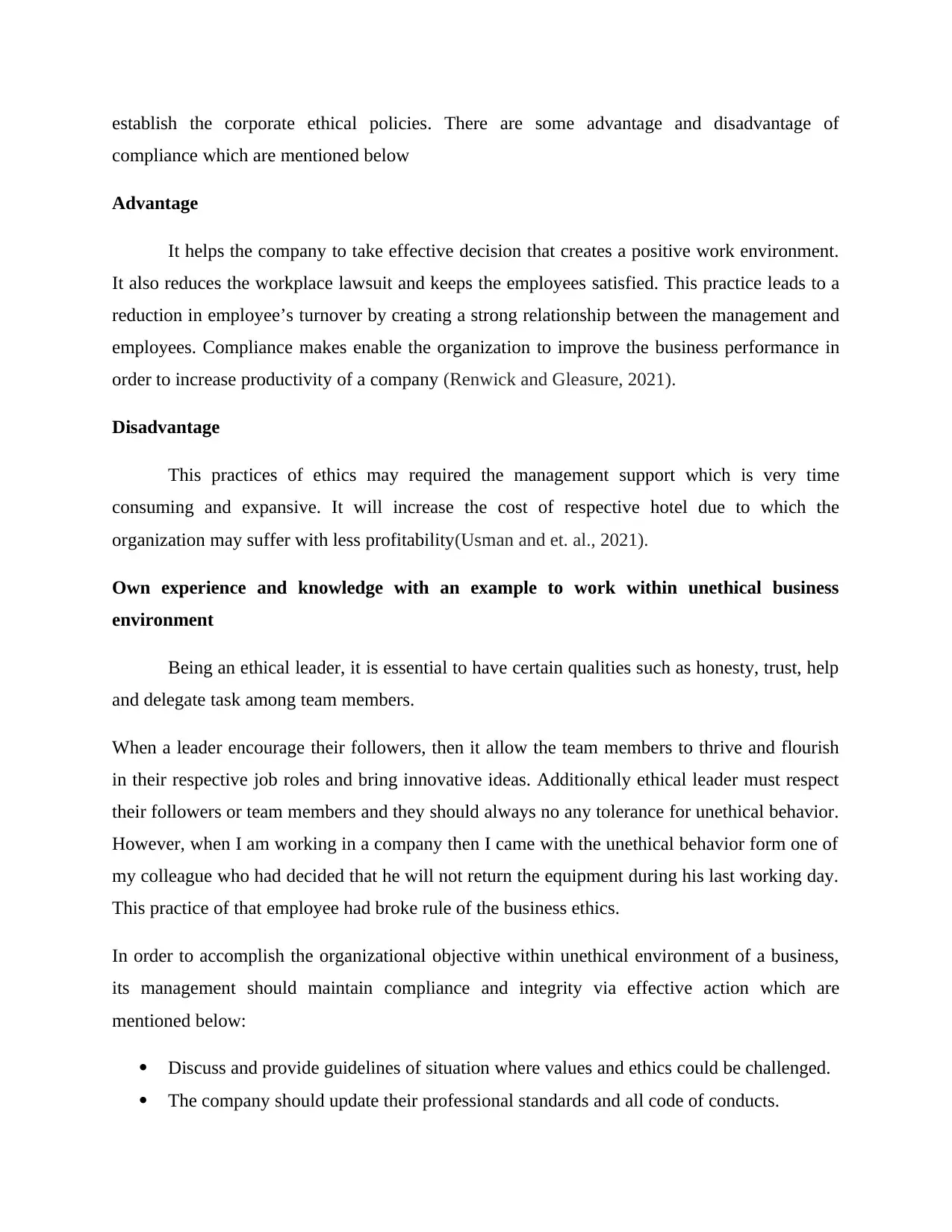
establish the corporate ethical policies. There are some advantage and disadvantage of
compliance which are mentioned below
Advantage
It helps the company to take effective decision that creates a positive work environment.
It also reduces the workplace lawsuit and keeps the employees satisfied. This practice leads to a
reduction in employee’s turnover by creating a strong relationship between the management and
employees. Compliance makes enable the organization to improve the business performance in
order to increase productivity of a company (Renwick and Gleasure, 2021).
Disadvantage
This practices of ethics may required the management support which is very time
consuming and expansive. It will increase the cost of respective hotel due to which the
organization may suffer with less profitability(Usman and et. al., 2021).
Own experience and knowledge with an example to work within unethical business
environment
Being an ethical leader, it is essential to have certain qualities such as honesty, trust, help
and delegate task among team members.
When a leader encourage their followers, then it allow the team members to thrive and flourish
in their respective job roles and bring innovative ideas. Additionally ethical leader must respect
their followers or team members and they should always no any tolerance for unethical behavior.
However, when I am working in a company then I came with the unethical behavior form one of
my colleague who had decided that he will not return the equipment during his last working day.
This practice of that employee had broke rule of the business ethics.
In order to accomplish the organizational objective within unethical environment of a business,
its management should maintain compliance and integrity via effective action which are
mentioned below:
Discuss and provide guidelines of situation where values and ethics could be challenged.
The company should update their professional standards and all code of conducts.
compliance which are mentioned below
Advantage
It helps the company to take effective decision that creates a positive work environment.
It also reduces the workplace lawsuit and keeps the employees satisfied. This practice leads to a
reduction in employee’s turnover by creating a strong relationship between the management and
employees. Compliance makes enable the organization to improve the business performance in
order to increase productivity of a company (Renwick and Gleasure, 2021).
Disadvantage
This practices of ethics may required the management support which is very time
consuming and expansive. It will increase the cost of respective hotel due to which the
organization may suffer with less profitability(Usman and et. al., 2021).
Own experience and knowledge with an example to work within unethical business
environment
Being an ethical leader, it is essential to have certain qualities such as honesty, trust, help
and delegate task among team members.
When a leader encourage their followers, then it allow the team members to thrive and flourish
in their respective job roles and bring innovative ideas. Additionally ethical leader must respect
their followers or team members and they should always no any tolerance for unethical behavior.
However, when I am working in a company then I came with the unethical behavior form one of
my colleague who had decided that he will not return the equipment during his last working day.
This practice of that employee had broke rule of the business ethics.
In order to accomplish the organizational objective within unethical environment of a business,
its management should maintain compliance and integrity via effective action which are
mentioned below:
Discuss and provide guidelines of situation where values and ethics could be challenged.
The company should update their professional standards and all code of conducts.
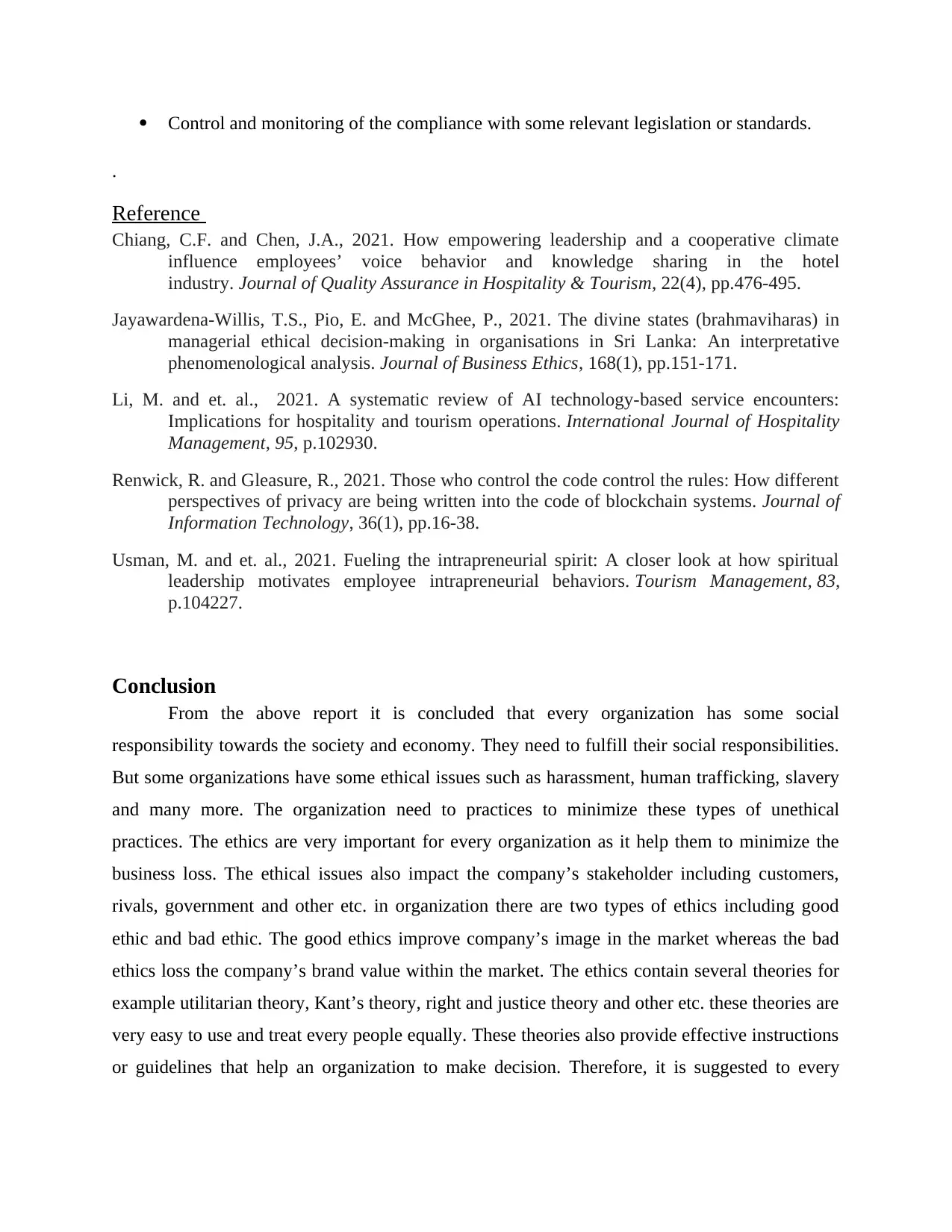
Control and monitoring of the compliance with some relevant legislation or standards.
.
Reference
Chiang, C.F. and Chen, J.A., 2021. How empowering leadership and a cooperative climate
influence employees’ voice behavior and knowledge sharing in the hotel
industry. Journal of Quality Assurance in Hospitality & Tourism, 22(4), pp.476-495.
Jayawardena-Willis, T.S., Pio, E. and McGhee, P., 2021. The divine states (brahmaviharas) in
managerial ethical decision-making in organisations in Sri Lanka: An interpretative
phenomenological analysis. Journal of Business Ethics, 168(1), pp.151-171.
Li, M. and et. al., 2021. A systematic review of AI technology-based service encounters:
Implications for hospitality and tourism operations. International Journal of Hospitality
Management, 95, p.102930.
Renwick, R. and Gleasure, R., 2021. Those who control the code control the rules: How different
perspectives of privacy are being written into the code of blockchain systems. Journal of
Information Technology, 36(1), pp.16-38.
Usman, M. and et. al., 2021. Fueling the intrapreneurial spirit: A closer look at how spiritual
leadership motivates employee intrapreneurial behaviors. Tourism Management, 83,
p.104227.
Conclusion
From the above report it is concluded that every organization has some social
responsibility towards the society and economy. They need to fulfill their social responsibilities.
But some organizations have some ethical issues such as harassment, human trafficking, slavery
and many more. The organization need to practices to minimize these types of unethical
practices. The ethics are very important for every organization as it help them to minimize the
business loss. The ethical issues also impact the company’s stakeholder including customers,
rivals, government and other etc. in organization there are two types of ethics including good
ethic and bad ethic. The good ethics improve company’s image in the market whereas the bad
ethics loss the company’s brand value within the market. The ethics contain several theories for
example utilitarian theory, Kant’s theory, right and justice theory and other etc. these theories are
very easy to use and treat every people equally. These theories also provide effective instructions
or guidelines that help an organization to make decision. Therefore, it is suggested to every
.
Reference
Chiang, C.F. and Chen, J.A., 2021. How empowering leadership and a cooperative climate
influence employees’ voice behavior and knowledge sharing in the hotel
industry. Journal of Quality Assurance in Hospitality & Tourism, 22(4), pp.476-495.
Jayawardena-Willis, T.S., Pio, E. and McGhee, P., 2021. The divine states (brahmaviharas) in
managerial ethical decision-making in organisations in Sri Lanka: An interpretative
phenomenological analysis. Journal of Business Ethics, 168(1), pp.151-171.
Li, M. and et. al., 2021. A systematic review of AI technology-based service encounters:
Implications for hospitality and tourism operations. International Journal of Hospitality
Management, 95, p.102930.
Renwick, R. and Gleasure, R., 2021. Those who control the code control the rules: How different
perspectives of privacy are being written into the code of blockchain systems. Journal of
Information Technology, 36(1), pp.16-38.
Usman, M. and et. al., 2021. Fueling the intrapreneurial spirit: A closer look at how spiritual
leadership motivates employee intrapreneurial behaviors. Tourism Management, 83,
p.104227.
Conclusion
From the above report it is concluded that every organization has some social
responsibility towards the society and economy. They need to fulfill their social responsibilities.
But some organizations have some ethical issues such as harassment, human trafficking, slavery
and many more. The organization need to practices to minimize these types of unethical
practices. The ethics are very important for every organization as it help them to minimize the
business loss. The ethical issues also impact the company’s stakeholder including customers,
rivals, government and other etc. in organization there are two types of ethics including good
ethic and bad ethic. The good ethics improve company’s image in the market whereas the bad
ethics loss the company’s brand value within the market. The ethics contain several theories for
example utilitarian theory, Kant’s theory, right and justice theory and other etc. these theories are
very easy to use and treat every people equally. These theories also provide effective instructions
or guidelines that help an organization to make decision. Therefore, it is suggested to every
⊘ This is a preview!⊘
Do you want full access?
Subscribe today to unlock all pages.

Trusted by 1+ million students worldwide
1 out of 13
Related Documents
Your All-in-One AI-Powered Toolkit for Academic Success.
+13062052269
info@desklib.com
Available 24*7 on WhatsApp / Email
![[object Object]](/_next/static/media/star-bottom.7253800d.svg)
Unlock your academic potential
Copyright © 2020–2026 A2Z Services. All Rights Reserved. Developed and managed by ZUCOL.





